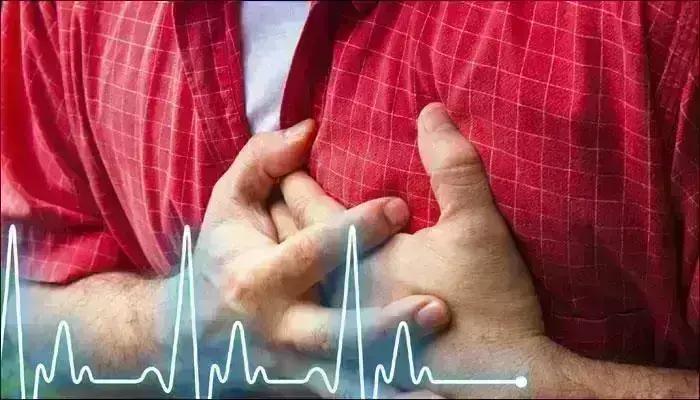Early Administration Of Epinephrine Prevents Out Of Hospital Cardiac Arrest: JAMA
- byDoctor News Daily Team
- 23 July, 2025
- 0 Comments
- 0 Mins

80% of cardiac arrests occurs at home, where defibrillators are usually not available and are therefore leading cause of death in the United States. Out of Hospital Cardiac Arrest (OHCA) is a serious problem that needs management to prevent mortality.
A new study by Masashi Okubo and their team suggested that timely administration of epinephrine prevents cardiac arrest out of the hospital. The study has been published in JAMA Network.
The objective of the study was to evaluate whether there is an association between the timing of epinephrine administration and patient outcomes after Out of Hospital Cardiac Arrest (OHCA).
The researchers conducted a cohort study that included adults around 18 years or older with Out of Hospital Cardiac Arrest (OHCA) treated by emergency medical services (EMS) personnel from April 1, 2011, to June 30, 2015. Initial cardiac rhythm was stratified as either initially shockable (ventricular defibrillation or pulseless ventricular tachycardia) or non-shockable (pulseless electrical activity or asystole). Eligible individuals were identified from among publicly available, de-identified patient-level data from the Resuscitation Outcomes Consortium Cardiac Epidemiologic Registry, a prospective registry of adults with EMS-treated, nontraumatic OHCA with 10 sites in North America. Data analysis was conducted from May 2019 to April 2021.
The researchers found that the primary outcome of the study was survival to hospital discharge. In each cohort of initial cardiac rhythms, patients who received epinephrine at any period (minutes) after EMS arrival at the scene were matched with patients who were at risk of receiving epinephrine within the same period using time-dependent propensity scores calculated from patient demographic characteristics, arrest characteristics, and EMS interventions.
Results of the study were found that out of 41,079 eligible individuals (median [interquartile range] age, 67 [55-79] years), 26,579 (64.7%) were men. A total of 10,088 individuals (24.6%) initially had shockable cardiac rhythms, and 30,991 (75.4%) had non-shockable rhythms. 8223 patients received epinephrine (81.5%) with shockable cardiac rhythms and 27,901 (90.0%) with non-shockable rhythms. In the shockable cardiac rhythm cohort, it was observed that the risk ratio (RR) for receipt of epinephrine with survival to hospital discharge was highest between 0 and 5 minutes after EMS arrival (1.12; 95%CI, 0.99-1.26) across the categorized timing of the administration of epinephrine by 5-minute intervals after EMS arrival they stated that finding was not statistically significant. Treating the timing of epinephrine administration as a continuous variable, it was seen the RR for survival to hospital discharge decreased 5.5% (95%CI, 3.4%-7.5%; P < .001 for the interaction between epinephrine administration and time to matching) per minute after EMS arrival. In the non-shockable cardiac rhythm cohort, it was seen that the RR for the association of receipt of epinephrine with survival to hospital discharge was the highest between 0 and 5 minutes (1.28; 95%CI, 0.95-1.72), although not statistically significant, and decreased 4.4% (95%CI, 0.8%-7.9%; P for interaction = .02) per minute after EMS arrival.
The researchers concluded that "Among adults with Out of Hospital Cardiac Arrest (OHCA), survival to hospital discharge differed across the timing of epinephrine administration and decreased with delayed administration for both shockable and non-shockable rhythms." Epinephrine timings can change the mortality rates in cardiac arrest management.
For further information: 10.1001/jamanetworkopen.2021.20176.
Disclaimer: This website is designed for healthcare professionals and serves solely for informational purposes.
The content provided should not be interpreted as medical advice, diagnosis, treatment recommendations, prescriptions, or endorsements of specific medical practices. It is not a replacement for professional medical consultation or the expertise of a licensed healthcare provider.
Given the ever-evolving nature of medical science, we strive to keep our information accurate and up to date. However, we do not guarantee the completeness or accuracy of the content.
If you come across any inconsistencies, please reach out to us at
admin@doctornewsdaily.com.
We do not support or endorse medical opinions, treatments, or recommendations that contradict the advice of qualified healthcare professionals.
By using this website, you agree to our
Terms of Use,
Privacy Policy, and
Advertisement Policy.
For further details, please review our
Full Disclaimer.
Tags:
Recent News
Gum disease could silently cause serious brain dam...
- 03 November, 2025
Can Early-Day Fasting Significantly Boost Metaboli...
- 03 November, 2025
Delhi HC bars doctor from running medical centre d...
- 03 November, 2025
Phase III data for Gazyva/Gazyvaro show significan...
- 03 November, 2025
Daily Newsletter
Get all the top stories from Blogs to keep track.


0 Comments
Post a comment
No comments yet. Be the first to comment!